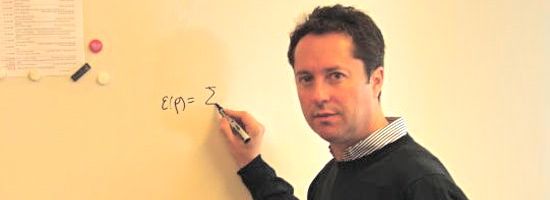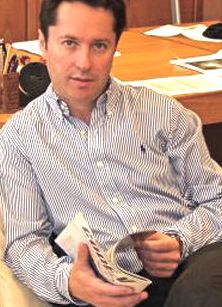VALENCIA. Juan Ignacio Cirac (Manresa, 1965) graduated in Theoretical Physics from the Complutense University of Madrid and has taught at the University of Castilla-La Mancha as well as in Leopold Franzens University (Innsbruck). In 2001, Cirac was appointed director of the Theoretical Division of the Max Planck Institute of Quantum Optics located in Garching, Germany. Juan Ignacio Cirac has been granted two honorary degrees (by the Polytechnic University of Catalonia and the University of Castilla-La Mancha) as well as many other awards, including the Prince of Asturias Award for Technical and Scientific Research, the Benjamin Franklin Medal in Physics and the Wolf Prize in Physics.
–
If quantum physics studies the smallest elements in nature (atoms, electrons, photons...), why do we need such large and sophisticated devices?
–Basically because we need a large amount of energy to study very small particles. We need a microscope to observe very small objects, but the amount of energy used increases as the size of the object decreases. To obtain this energy we need large and very accurate equipments.
–
You work within the area of quantum computing. I suppose you have to explain what quantum computing is whenever you meet someone new. How do you do it?
–
Well... It is a science that has been developed in the last twenty years and which uses the laws of quantum physics in order to process and transmit data differently. This entails a more efficient computing and data transmission, as well as a safer way to do so.

–Should current scientific research be more practical and focus on what is more economically profitable, especially in technological research?
–
No, it should not. It is not its duty. Actually, there are two different types of research -one that should seek to be economically profitable, and one that should not. For example, if you wish to produce a pen that lasts longer, you need to carry out a particular type of research that should result in a pen competing with other brands in the market. That is short-term research. However, there is another type of research that is carried out on the long-term. This type of research does not seek to develop any particular product, but intends to achieve bigger goals that can transform the world of technology. This is what many physicists and scientists do and what research in quantum computing is about. Quantum computing does not intend to build a quantum computer but to develop a kind of technology that affects not only computers, but also communication systems and other things we can't even start to imagine.
–Is Europe competitive regarding scientific and technological knowledge?
–
It depends on the field you are referring to. In my field it definitely is. Some years ago the UE promoted research programmes that enabled cooperation between countries which resulted in a fast development of quantum computing in Europe. Europe is way ahead of the USA or Japan in this area.
Full text available at Mètode's website.
___________________________________________________________________________________
Lucía Sapiña. The Two Cultures Observatory.
Photos: Max Planck Institute
Noticias relacionadas
 AVISO DE COOKIES: Este sitio web hace uso de cookies con la finalidad de recopilar datos estadísticos anónimos de uso de la web, así como la mejora del funcionamiento y personalización de la experiencia de navegación del usuario. Aceptar
Más información
AVISO DE COOKIES: Este sitio web hace uso de cookies con la finalidad de recopilar datos estadísticos anónimos de uso de la web, así como la mejora del funcionamiento y personalización de la experiencia de navegación del usuario. Aceptar
Más información


 imprimir
imprimir meneame
meneame

 whatsapp
whatsapp